30.06.2025
India Week Hamburg at HCU Hamburg
Covisioning Smart Cities - TOSCA in India
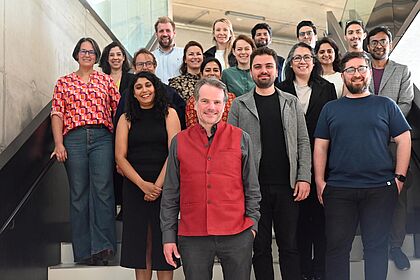
Vom 23.6. bis zum 29.6. feierte Hamburg die India Week Hamburg. Wir nutzten diese Gelegenheit und stellten das TOSCA-Indien-Projekt unter dem Titel „Covisioning Smart Cities, India: Eine urbane digitale Verbindung mit Hamburg” vor – das Beispiel TOSCA in Indien. Die Veranstaltung wurde gemeinsam von der HafenCity Universität Hamburg (HCU) und der Deutschen Gesellschaft für Internationale Zusammenarbeit (GIZ) GmbH organisiert und präsentierte nachhaltige Stadtentwicklungsprojekte in Indien mit Schwerpunkt auf partizipativen digitalen Planungsinstrumenten.
Auf der Veranstaltung wurde der Abschluss des TOSCA-Projekts zur Unterstützung indischer Städte präsentiert, das sich mit städtebaulichen Herausforderungen und räumlich angepassten digitalen Lösungen befasst. Dieser Anlass bietet weitere Möglichkeiten für Wissensaustausch und Zusammenarbeit. Wir stellten das TOSCA-Indien-Projekt unter dem Titel „Covisioning Smart Cities, India: Eine urbane digitale Verbindung mit Hamburg” vor – der Fall TOSCA in Indien.
09.04.2025
A Year of Innovative Digital Tooling for Ukraine
HCU researchers to support sustainable urban planning and reconstruction in Ukraine
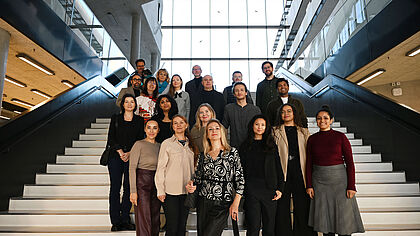
The cooperation between HafenCity University (HCU) and the Deutsche Gesellschaft für Internationale Zusammenarbeit (GIZ) GmbH successfully concluded a project focused on integrated urban development and reconstruction planning in Ukraine. In collaboration with local and national stakeholders in Ukraine, the SURPRISE project implemented prototype initiatives, developed citizen participation campaigns, and enhanced capacity for data-driven urban planning.
In November 2024, the project SURPRISE (“Sustainable Urban Planning and Resilient Reconstruction in Ukraine with Spatial Data Science”) successfully concluded, marking a step forward for integrated and sustainable urban development in Ukraine. Funded by the German Federal Ministry for Economic Cooperation and Development (BMZ) through the Special Expert Fund (SFF), the project was a collaborative effort between the chair of Digital City Science at HCU, GIZ, the Ministry of Restoration of Ukraine, and cities of Vinnytsia, Poltava, Zhytomyr, and Chernivtsi.
By sharing best practices and piloting innovative solutions, the project has equipped Ukrainian cities with tools and strategies to enhance urban planning processes and facilitate better collaboration between stakeholders. These efforts were complemented by training and capacity-building initiatives to ensure the sustainability of the project’s outcomes. The main outcomes of the SURPRISE project include tailored recommendations for updating Urban Planning Cadaster systems, data-driven approaches for collaborative urban development, and model campaigns to enhance citizen participation in planning processes.
At the chair of Digital City Science (Prof. Jörg Rainer Noennig), the project was led by Jennifer Jiang, a trained architect and urban practitioner, who coordinated the research work of the HCU team. The team included urban development expert Arjama Mukherjee, data scientists Hana Elattar and Husain Vaghjipurwala, and XR developer Vincent Holtorf, among others.
Despite the ongoing war in Ukraine, the project team navigated regional challenges by adopting an agile and incremental approach, ensuring the effective delivery of its objectives.
The SURPRISE project has demonstrated the value of combining expertise in digital city science with practical implementation strategies to address topical urban challenges. The year-long partnership between HCU, GIZ, and Ukrainian stakeholders provides a strong foundation for potential future collaborations to further advance digital urban planning in Ukraine.
01.04.2025
ARTUR: Urban resilience for Ukrainian Cities
After 16 months of intensive work with Ukraine, our ARTUR project has brought Digital City Science one step closer to drafting resilience-oriented strategies for urban development.

February 2025 marked the closure of our exciting project “ARTUR” in cooperation with the GIZ and Ukrainian cities, focused on devising innovative approaches towards the recovery of Ukraine via resilience-oriented measures.
At the end of February, the Chair of Digital City Science (DCS) at the HafenCity University (HCU) Hamburg hosted the Online Closure event for their ARTUR project, or short for Approaches towards Urban Resilience in Ukraine - Models, Methods and Tools to Strengthen Urban Resilience.
After a runtime of 16 months, the cooperation project concluded with insightful outcomes. The event brought together the research team from DCS, coordination partners from the GIZ-DE and GIZ-UA, representatives of the two cooperating cities (Kryvyi Rih and Nikopol), as well as local experts involved in the strategic development of Ukraine. A productive exchange highlighted the usefulness of resilience-oriented instruments in the region and identified common interest of all sides in developing such tools.
The local piloting experience in collaboration with the Kryvyi Rih and Nikopol authorities showed the positive impact that this innovative framework and interactive concept tool can bring to cities for their recovery and long-term development, when further implemented.
ARTUR was carried out within the framework of the project "Strengthening Urban Resilience in the Areas of Supply Infrastructure and Housing in Ukraine (SUR)" which is a part of the German transitional development assistance, commissioned by the Federal Ministry for Economic Cooperation and Development (BMZ) and implemented by the Deutsche Gesellschaft für Internationale Zusammenarbeit (GIZ) GmbH
Project Funding Volume: €225K.
22.11.2024
Digital Launch "SURE Solutions" Science mag
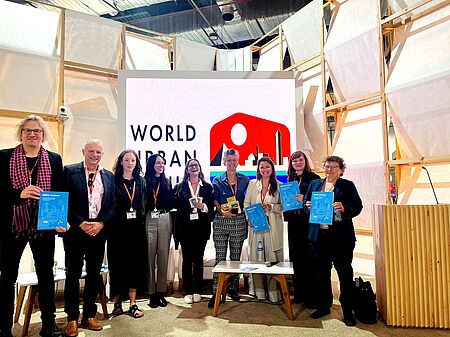
SURE Solutions is a science magazine bridging academic knowledge and practical implementation for a sustainable urban future. Unveiled at the UN Habitat World Urban Forum with some of the contributing authors.
You can download it here: SURE Solutions Vol.1
Over 50 contributors from Germany, Thailand, Vietnam, Cambodia, China, and beyond, sharing actionable insights on urban resilience, sustainable infrastructure, climate adaptation, and more in the first Volume of the SURE Solutions magazine. We are happy to announce that a physical launch event is coming soon!
11.11.2024
HCU Digital City Science at SmartCity Expo Barcelona 24
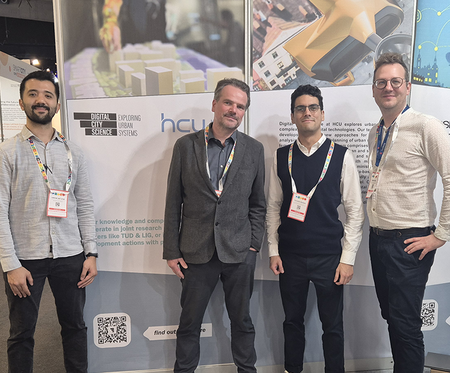
Together with our partners Laboratory of Knowledge Architecture (Technische Universität Dresden) Landesbetrieb Immobilienmanagement und Grundvermögen, Landesbetrieb Straßen, Brücken und Gewässer (LSBG) and TÜV Rheinland Group we attended the Smart City Expo World Congress in Barcelona!
As a special guest we had Mirko de Paoli (German Smart City Association / Bundesverband Smart City) with us. Prof. Dr.-Ing. Jörg Noennig, Benjamin Dally, Fernando Montaño and Mehmet Akif Ortak presented the chair's tools and projects.
04.11.2024
ARTUR Workshop with Ukrainian cities in Kiev
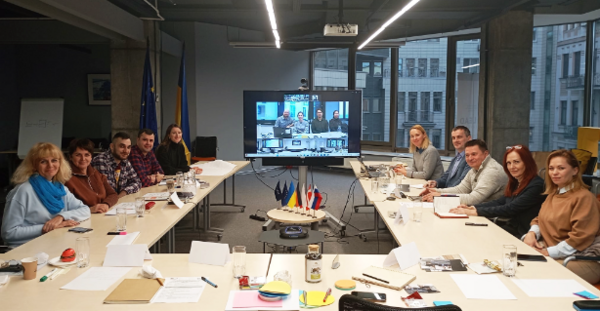
Monday 4th of November, researchers from the HafenCity University (HCU) Hamburg met with representatives of the Ukrainian cities of Kryvyi Rih and Nikopol, in the Headquarters of the GIZ-UA in Kiev. The purpose of this meeting was to carry out a hybrid workshop, with participants on ground and online, as well as coordinators of the GIZ-UA; within the framework of the SUR cooperation project "Strengthening of Urban Resilience in the Areas of Supply Infrastructure and Housing in Ukraine”. The goal of the workshop was to align with the two piloting cities of the ARTUR project (Approaches toward urban resilience in Ukraine), developed by the team of HCU, on the prioritisation of challenges with the support of the developed framework in the ARTUR project.
25.09.2024
Digital City Science bei der Expo Real 2024
07. Bis 09. Oktober, Messe München, Halle B2 / Hamburg Stand
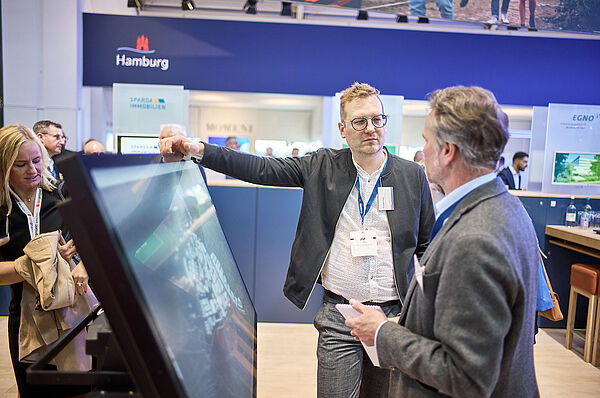
Wir nehmen an der diesjährigen Expo Real teil. Professor Jörg Rainer Noennig und Benjamin Dally Projektleitung (LIG3 + VIRION) präsentieren die aktuellen Forschungsprojekte des Lehrstuhls. Wir freuen uns auf neue Kontakte und interessante Gespräche. Sprechen sie uns an oder treffen sie uns in Halle B2 am Hamburg Stand (430).
23.09.2024
Keynote by Prof. Noennig at BIM Day Hamburg
Third BIM Day Hamburg at HCU Hamburg
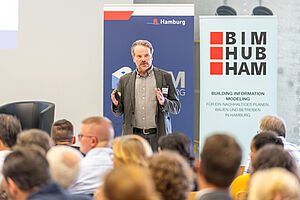
On September 18, 2024, the 3rd BIM Day Hamburg took place at the HCU Hamburg, jointly organized by BIM Hub and BIM Hamburg. In his keynote speech at the event, Professor Jörg Rainer Noennig reported on the work of the “Research & Teaching” control center within the BIM Hamburg network, which brings together all public institutions in Hamburg that are committed to the use and further development of Building Information Modeling. At the HCU, the topic of BIM is primarily anchored in the BIM Lab - a loose association of professorships in which the Digital City Science professorship is also actively involved.
16.09.2024
Digital City Science presents at WEF Global Future Council on the Future of Cities
DCS Presenting TOSCA and ongoing projects
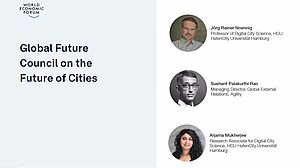
It was a great honour for HafenCity Universität Hamburg (HCU)'s Digital City Science to be invited to present our work to the World Economic Forum's Global Future Council on the Future of Cities. It was co-chaired by Carlo Ratti and the newly appointed Mayor of Kuala Lumpur Dr Maimunah Mohd Sharif to discuss the challenges and opportunities in designing smart cities. We presented our ongoing projects in the lab, especially our work in the TOSCA project (Toolkit for Open and Sustainable City planning and Analysis) in India, where we built an open-source web-GIS tool to support integrated urban development in Indian cities, highlighting low-resource approaches to digital technology for urban planning.
29.08.2024
Supporting Ukraine’s Urban Development with Digital Tools
HafenCity University's chair of Digital City Science supports sustainable urban planning and reconstruction in Ukraine.
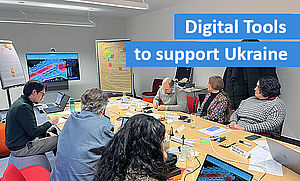
The cooperation between HafenCity University (HCU) and the Deutsche Gesellschaft für Internationale Zusammenarbeit (GIZ) GmbH implements a project focused on urban development and reconstruction planning in Ukraine. The SURPRISE project introduces state-of-the-art digital planning methodologies and tools, along with the respective capacity building for Ukrainian stakeholders. In the project, HCU partners with the Ministry of Restoration of Ukraine and four municipalities—Vinnytsia, Poltava, Zhytomyr, and Chernivtsi, among others.
SURPRISE (“Sustainable Urban Planning and Resilient Reconstruction in Ukraine with Spatial Data Science”) is a project funded by the German Federal Ministry for Economic Cooperation and Development (BMZ) through the Special Expert Fund (SFF). In March 2024, the project kicked off with two days of workshop that addressed issues and challenges faced by the participating cities regarding the updating of such existing planning concepts, including their urban planning cadasters.
Throughout June and July 2024, the Digital City Science team at HCU led a series of scoping and project planning online workshops for both representatives of the Ministry of Restoration of Ukraine and the municipalities of Vinnytsia, Poltava, Zhytomyr, and Chernivtsi.
In-depth exchanges took place under the moderation of GIZ, during which the Digital City Science team introduced digital planning methodologies and tools to establish the project’s scope and planning, considering both topical and emergent needs from both the state and local levels to accelerate the updating of existing planning concepts and to enable new levels of citizen participation and co-creation.
The project entered recently its execution phase, aiming to conclude in November 2024 with completed pilot projects to support Ukraine in its ongoing urban development and reconstruction efforts.
Scaling up HCU´s Urban Planning Toolkit in India
Digital Toolkit TOSCA supports integrated and sustainable urban development in four Indian Cities
In the new cooperation project with GIZ and working on behalf of the German Federal Ministry for Economic Cooperation and Development (BMZ), the chair of Digital City Science at HafenCity University Hamburg (HCU) aims to support Indian cities in the field of climate-resilient planning and integrated land-use development. The project will introduce the Toolkit for Open and Sustainable City Planning and Analysis (TOSCA) to stakeholders in four cities in the Indian states of Tamil Nadu, Kerala, Karnataka and Telangana.
TOSCA has been developed in cooperation with the GIZ since 2019 by the chair of Digital City Science (Prof. Jörg Rainer Noennig) and has already been tested in the Indian city of Bhubaneswar in the last years. By involving local authorities, enterprises and academic institutions in more cities, it is envisioned to bring TOSCA into broader application. In addition, the project will extend the functional range of the toolkit in response to specific local needs. To secure the continuous application of the toolkit throughout India, the project partnership will also build up requisite local human capacities by trainings, workshops and educational formats. A kick-off workshop was carried out in Hyderabad, India by the TOSCA team in the end of April 2023. Together with GIZ, and participants and representatives from the partner states of Tamil Nadu, Kerala, Karnataka and Telangana, the workshop enabled interactive brainstorming sessions to collect new use-cases to address critical urban challenges in Indian cities.
The project is unique as it provides advanced yet easy-to-use technology that enables local stakeholders to plan their urban environments with open source data in a highly participatory way. Starting from February 2023, the project will run for approximately two years under a grant agreement with the BMZ.
LIG II: End of Project
Data-driven research project on real estate management comes to an end
NLP and geoparsing helps the Hamburg city government to optimize parcel finding procedures
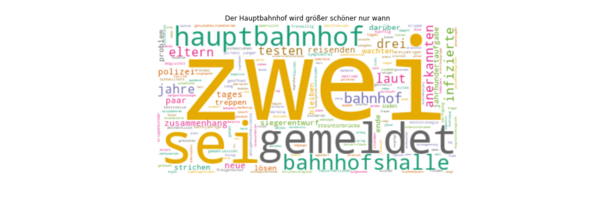
The research project LIG II comes to an end. Its main objectives were to include a geoparsing concept and build a semi-automatic process to analyse free text data. In addition to that, the LIG Finder web application was further developed – a prototype of it has been built in LIG I, which started in 2020.
LIG I and II were led by the research group Digital City Science with Prof. Jörg Nönnig as head of the team, based at HafenCity University Hamburg (HCU). It is a cooperation between the HCU and the Landesbetrieb Immobilienmanagement und Grundvermögen (LIG). The project began with focusing on building an interactive web tool for optimizing site selection.
The LIG Finder Application follows the client-server architecture. In the updated version, the research team used Maplibre Gl JS, because of its superior rendering performance and its 3D rendering potentials. For the semi-automatic geoparsing workflow, the DCS-team used Python for the following steps: data clean preprocessing, Location Extraction, Geo coordinate conversion (Geocoding with Nominatim API), Keyword analysis, Sentiment analysis (with VADER) and Topic modelling (with Structured Topic Modelling, STM).
The foundings of LIG II will be published in the journal paper “Data Politics in the Built Environment” (author: Dr. Filipe Mello Rose, among others). For LIG III, the DCS team plans to adapt AI tools such as ChatGPT and ChatGeoPT to train a real estate language model and further transfer the LIG location finder concept to other domains of urban knowledge management.
Hightech for Smart Social Strategies
Research cooperation between HCU Hamburg and Technion - The Israel Institute of Technology
The Smart Social Strategies Lab at Technion–Israel Institute of Technology in Haifa and the chair of Digital City Science at HCU Hamburg have initiated a research cooperation on digital interactive technologies in the field of sociospatial urban development.
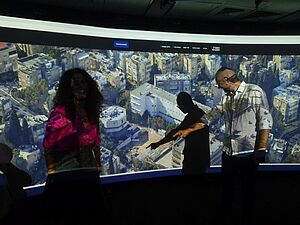
At the beginning of 2023, a first ignition phase for an envisioned long-term research partnership between Technion and HCU has been successfully accomplished. Supported with an incentive funding from HCU, first joint activities of research groups in both institutions have been carried out over a period of 1 year, including scientific visits, joint workshops and conferences. Partner at Technion is the the Smart Social Strategy Lab (3SL) directed by Prof. Meirav Gutman, an interdisciplinary group that investigates the usage of geographical and sociographical data for urban strategy- and policy-making. Methodically and technologically, the group´s research complements very well with interactive planning technologies that are created at the chair of Digital City Science (Prof. Jörg Rainer Noennig) at HCU Hamburg. The cross-connection of both approaches opens up promising opportunities for supporting the planning of urban neighbourhoods with state-of-the-art tools and methodologies. On HCU side, the cooperation was coordinated by Dr. Jan Barski und Dr. Filipe Mello Rose. The overall goal was to explore first topics for a common research agenda on which both institutions will join forces in the next years. Joint publications and funding applications for example to the German-Israeli-Fund have prepared a solid basis for various future cooperation in which Technion´s spectacular Hadar Interaction Theatre – a large scale facility for digital citizen participation – will play a key role.
TOSCA toolkit for flood simulation in Kochi (India)
HCU Researchers Support Flood Simulation Cases in India
In the context of the EU program “International Urban Regional Cooperations” (IURC), researchers of HCU´s chair for Digital City Science have adapted the TOSCA toolkit for flood simulation in Kochi (India).
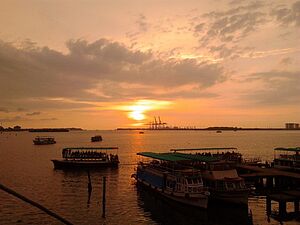
At the end of march an international project cooperation of HCU Digital City Science with the cities of Kochi (India) and Messina (Italy) has been successfully accomplished. After a runtime of half a year, a final project workshop has concluded the results and findings of the international initiative.
At the HCU chair of Digital City Science (Prof. Noennig), the project was led by Arjama Mukherjee, a trained architect and city scientist, who coordinated the research work of the HCU team. The team also included the GIS developer Mehmet Akif Ortak and international urban development expert Maria Moleiro Dale.
Cooperation partners involved in the projects were the city of Kochi, the city of Messina, University of Messina and the IURC program of the European Union. The project had started with the ambition to define new use cases for Toolkit for Sustainable City Planning and Analysis (TOSCA), especially in the field of Flood Simulation. TOSCA that was developed at the chair over the past years and implemented already in India, Ecuador and Palestine.
To determine the new use case, the partnership has carried out several online workshops, joint research and technical work in the field of flood simulation and modelling. The main outcome of the project is a prototype module based on Machine Learning algorithms that help to predict flood scenarios in the future.
Unique and innovative about the project was the intense and close ad hoc cooperation, that was brokered by the IURC after they had heard about the potentials of TOSCA. The results of the project will help to make cities more resilient against floods by exploiting the opportunities of digital urban data and intelligent geo-information analysis. It is expected to lead to follow-up activities between the cities, first steps are being taken, and first concepts have been drafted.
The project was supported by IURC which targets and supports strategic partnerships of cities worldwide on topics of urban and regional development.
Consortium Meeting MOVE21

(September 2022)
The MOVE21 general assembly and study visit to Oslo and Gothenburg were carried out starting with the presentations by Vegar Andersen (Political Adviser to the Governing Mayor of the City of Oslo) and Maria Oscott (Head of mobility at Lindholmen Science Park, Gothenburg). The MOVE21 partners had some inspiring and foresighted discussions.
KES International Conference in Verona

(September 2022)
DCS contributed to the conference by clarifying the "Digital Approaches to Social Dynamics in Cities", the "Science of Tooling", and the "Digitalization" of urban bicycling data - among others.
DaFne at GAMA Days & Knowledge-Based and Intelligent Information and Engineering Systems Conference

(June-September 2022)
DaFne’s first steps in experimenting with the DCS data sets were presented in collaboration with the Center for Information Sevices & HPC, TU Dresden on 22.06 at the GAMA Days. Synthetic Pedestrian Data Generation is investigated to improve mobility pattern recognition of citizens for smarter cities. Dafne will be presented also on 26th International Conference on Knowledge-Based and Intelligent Information and Engineering Systems conference on 7-9 September 2022.
DaFne – Plattform Data Fusion Generator für die Künstliche Intelligenz (haw-hamburg.de)
SURE at 11th World Urban Forum in Katowice

(June 2022)
The SURE Facilitation and Synthesis Research team organizes a Networking Event titled: Science Meets Policy: New approaches for multisectoral collaborations to build urban-rural resilience for sustainable futures at the 11th World Urban Forum in Katowice, Poland. Participants will be able to meet the SURE collaborative projects and discuss topics, e.g. innovative practices and tools for multisectoral collaboration to build transformative urban-rural adaptation and resilience in Southeast Asia and China. We invite you to join our Networking Event on the 30th of June 2022, between 12:15 -13:45.
DaFne team met in Creative AI Symposium Hamburg 2022

(June 2022)
Part of the DaFne team (HAW-HCU) met in Creative AI Symposium by Artificial Intelligence Center Hamburg (ARIC) e.V. on 17.06 in Hamburg office of Ströer AG in Speicherstadt Hamburg. The musical composition with quantum computers presented by Prof. Eduardo Miranda from Great Britain. Part of the DaFne team (HAW-HCU) met in Creative AI Symposium by Artificial Intelligence Center Hamburg (ARIC) e.V. on 17.06 in Hamburg office of Ströer AG in Speicherstadt Hamburg. The musical composition with quantum computers presented by Prof. Eduardo Miranda from Great Britain.
DaFne – Plattform Data Fusion Generator für die Künstliche Intelligenz (haw-hamburg.de)
The ECOMM2022 Conference on Sustainable Mobility

(June 2022)
MOVE21 and its sister initiative Scale-Up organized a session. Session theme was governance innovation for decarbonizing urban mobility and logistics; Scale-purpose Up's is to drive green and inclusive mobility development in European cities. The meeting was presided over by Lucian Zagan, Eurocities, who is involved in both initiatives. Jess López Baeza of MOVE21 finished the event by highlighting urban vitality and public space use in Altona, Hamburg, as a result of the smart placement of street-scale logistic hubs.
Micado Final Consortium

(May-June 2022)
At the end of May, the final Consortium of Micado meeting took place in person in Hamburg, where all project partners came together for three days of productive discussions, presentations, and fun. The event marathon was completed by a presentation, live demo, and roundtable discussion in the Hanse Office in Brussels on the 2nd of June. A great audience and a fruitful penal discussion contributed to new inspirations to develop ICT solutions with and for migrants as well as how to facilitate the uptake of EU-funded projects.
MOVE21 Site Visit: Hamburg
(May 2022)
HafenCity University, City of Hamburg, Altona District, and local stakeholders organized a 3 days event including site visits, study, networking, walking, and cycling, showing to the MOVE21: Zero-Emission 21st Century consortium the ambitious plans and ongoing initiatives in the Hamburg pilot.
Micado LESC Meeting

(April-May 2022)
The MICADO (Migrant Integration Cockpits and Dashboards) project is approaching the end of its funding period and has been pitched to the diverse local and regional governments to guarantee its uptake. Moreover, a series of meetings took place during the last months. It started in April with a developer’s event – a technical brainstorming to increase MICADO’s intuitiveness and accessibility. The final LESC (local experts and stakeholder committee) followed at the beginning of May.
TOSCA Begins in Palestine
(March 2022)
The Toolkit for Open and Sustainable City Planning and Analysis (TOSCA), developed under the Digital City Science, in cooperation with GIZ and local partners, begins a following development phase in the Palestinian regions. From March 2022 until January 2023, the HafenCity University Hamburg in cooperation with the Deutsche Gesellschaft für Internationale Zusammenarbeit (GIZ) GmbH, the Ministry of Local Governments and the An-Najah National University in Nablus, will be working together in the further development and implementation of the Toolkit for Open and Sustainable City Planning and Analysis (TOSCA), with the purpose of streamlining the housing development process and diminishing environmental impacts. The Toolkit serves as support for the realm of urban planning, in view of the dramatic population density increase and criticality of land availability in the region, especially in the peripheral areas outside of the Urban Master Plans.
Source of the Photo: International Art Academy of Palestine (Bloomberg.com)
Call for Papers for the 26th International Conference on Knowledge-Based and Intelligent Information & Engineering Systems

(March 2022)
We are looking for papers on the topic of our session: “The urban-social layer: Digital Approaches to Social Dynamics in Cities”
Deadline to to receive your manuscripts is before the 4th of April 2022!
SURE Research Project Develops Measures for Sustainable Cities in Asia

(February 2022)
In cooperation with the Technical University of Lübeck and TÜV Rheinland Consulting, more than 150 collaborative projects in Southeast Asia are funded and supported by means of scientific accompanying research, cross-project synergies and transfer potentials.
MICADO team publication about Complex Arrival Procedures as a Challenge in Migration Studies

(January 2022)
Rosa Thoneick, Marie Malchow, Ingrid Breckner and Jörg Noennig are examining migration from an urban perspective and are providing a comparative analysis of quantitative and qualitative methodologies within migration research. The publication by Leuven University Press examines the use of co-creative methods to study migrant integration across European societies and assembles further articles about the DCS Horizon-2020 MICADO project.
Co-creation in Migration Studies
Medifly Citizen Survey Online

(Dezember 2021)
Taking into account the hopes, concerns and attitudes of citizens is an integral part of the Medifly project. With the online-based, anonymous survey, we want to find out what the citizens of Hamburg think about the use of drones for the transport of medical goods, but also for other purposes.
MOVE21 - Micro-Hubs as a solution for the Last-Mile-Problem

(December 2021)
Prof. Dr.-Ing. Jörg Rainer Noennig und Dr. Jesús López Baeza explain to Future Moves how cities could achieve a 30% reduction of transport-related emissions by 2030 via the implementation of 15 transport-related innovations.
MICADO is starting its piloting phase

(November 2021)
The DCS Horizon2020 Project is entering its final piloting phase. Throughout 2021 the MICADO solution has been tested extensively with local stakeholders. The cities of Antwerp, Bologna, Hamburg and Madrid are now starting to test the MICADO app, a software solution to improve integration processes. Learn more about piloting in the MICADO cities, local requirements, and the variety of local stakeholders involved.
DCS Team at the ITS World Congress

(Oktober 2021)
Our team at the ITS Congress, the biggest event focused on smart mobility and the digitalisation of transport. Our mobility projects MOVE21, Medifly and i-LUM could raise awareness of smart mobility solutions among policy makers, experts and the general public.
Digital building data: EDGE research project aims to improve potentials of the smart city
Entwürfe für ein neues Stück Stadt auf dem Grasbrook mit dem digitale Planungstool der Digital City Science

(September 2021)
Die Grasbrook Dokumentation- sbroschüre liefert spannende Einsichten zum Wettbewerblichen Dialog und Beteiligungsverfahren. Unser digitales Planungstool Grasbrook CityScope wird im Rahmen des Planungsverfahrens dazu genutzt nachhaltige Mobilitätskonzepte zu simulieren und zu entwickeln. Mehr über das Modul Walkability und die Noise und Stormwater Module sind ab S.26 zu finden.
Publication Out Now: Digital City Science. Researching New Technologies in Urban Environments. Perspectives in Metropolitan Research 6

(August 2021)
How do science and technology shape future cities—and how do cities shape science and technology in return? Who are the architects and actors behind these processes? Driven by a transdisciplinary approach, Perspectives in Metropolitan Research 6 elaborates on the intertwinements of science, technology, and cities.
The contributions discuss recent theoretical approaches on how to look at the intersection between digitalization and cities scientifically, as well as how to define one’s role as a researcher.
You can order the publication directly at Jovis
SURE Synergyworkshop „Lessons Learned: From Research to Action“
(July 2021)
More than 50 international resarchers participated in the digital workshop providing feedback from the former project „FutureMegacities“ and defining methods and milestones for the SURE project focusing on sustainable city development in East and Southeast Asia.
SURE – Sustainable Development of Urban Regions is an accompanying research project by the Digital City Science at HafenCity Universität Hamburg (HCU), TU Lübeck, TÜV Rheinland & the Federal Ministry of Education and Research, BMBF.
Cities-4-People project impact analysis at CORDIS EU research results
(July 2021)
Many urban and peri-urban areas of EU cities face common mobility challenges. CORDIS EU explains how our people-oriented approach in the Cities-4-People project has been working to improve transportation and increase urban sustainability. New approaches for community-driven sustainable mobility innovations at neighbourhood and urban district level.
New Publications by the DCS Team
(June 2021)
CityScope Platform for Real-Time Analysis and Decision-Support in Urban Design Competitions. Julia Sievert, Jesús López Baeza, Andre Landwehr and Jonas Luft
Defining Parameters for Urban- Environmental Quality Assessment. Jan Barski, Jesús López Baeza, Jörg Rainer Noenni,Oto Novacek
Evaluating Cultural Impact in Discursive Space through Digital Footprints. Jesús López Baeza, Jes Bley, Kay Hartkopf, Martin Niggeman
Implementing Gehl’s Theory to Study Urban Space. The Case of Monotowns. Damiano Cerrone, Jesús López Baeza, Panu Lehtovuori, Daniele Quercia
Testing Optimization Scenarios of Cruise Passenger Ground Transportation Using Agent-Based Models and Crowd-Sourced Data. Jesús López Baeza, Jörg Rainer Noennig, Vanessa Weber, Arnaud Grignard, Ariel Noyman, Kent Larson, Tri Nguyen-Huu, Sebastian Saxe, Ulrich Baldauf
MICADO Project in Spanish Newspaper EL PAÍS
(May 2021)
While entering its final phase our Horizon 2020 Project MICADO: Migrant Integration Cockpits & Dashboards got extensive coverage in the Spanish newspaper EL PAÍS. Congratulations to our partners in Madid Madrid - Illustre Colegio Nacional de Doctores y Licensiados en Ciencias Politicas y Sociologia (CPS), Universidad Rey Juan Carlos, Madrid (URJC), Direccion General de Servicios Sociales e Integracion Social-Consejeria de Politica Social y Familia de la Communidad de Madrid (DGSSIS).
IMISCOE Conference Panel Accepted
(May 2021)
A conference panel suggested by the HCU´s coordinator team of the H2020 project „Migrant Integration Cockpits and Dashboards“ (MICADO) for the IMISCOE conference in July 2021 was accepted. IMISCOE (International Migration, Integration and Social Cohesion in Europe) is Europe's largest interdisciplinary research network in the field of migration, integration and diversity studies. The panel will comprise 5 paper presentations from the MICADO partners and will be lead chaired by Prof. Ingred Breckner and Prof. Jörg Rainer Noennig, both HCU. https://www.imiscoe.org
BMBF Funding for New Research on AI
(April 2021)
A joint proposal between Digital City Science group at HCU, Hamburg University of Applied Sciences (HAW), the Center for Scalable Data Analytics and Artificial Intelligence (SCADS-AI) and the company Stroer was accepted for funding from the German Ministry for Education and Research (BMBF). The consortium led by HAW Professor Ulrike Steffens will investigate new approaches of synthesizing data for training AI for urban management and development tasks. Call: https://www.bmbf.de/foerderungen/bekanntmachung-3068.html






